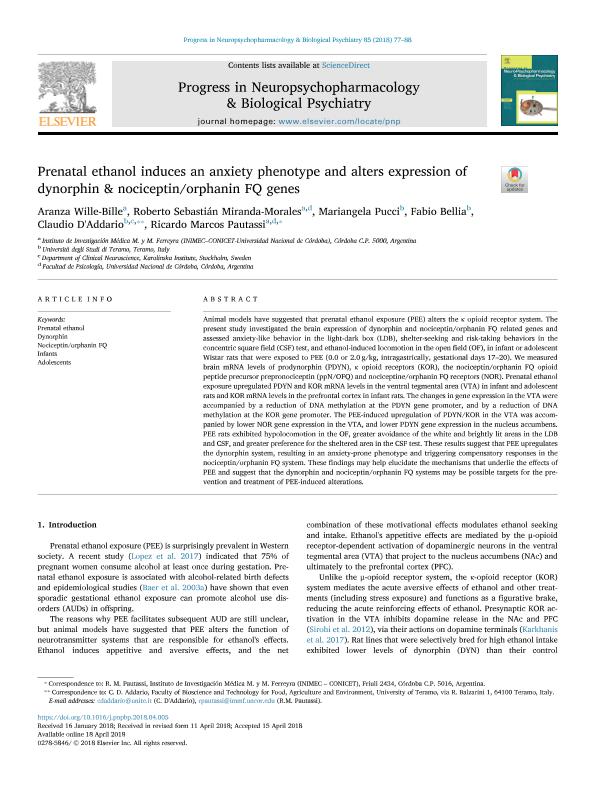Artículo
Prenatal ethanol induces an anxiety phenotype and alters expression of dynorphin & nociceptin/orphanin FQ genes
Wille-bille, Aranza ; Miranda Morales, Roberto Sebastián
; Miranda Morales, Roberto Sebastián ; Pucci, Mariangela; Bellia, Fabio; D'Addario, Claudio; Pautassi, Ricardo Marcos
; Pucci, Mariangela; Bellia, Fabio; D'Addario, Claudio; Pautassi, Ricardo Marcos
 ; Miranda Morales, Roberto Sebastián
; Miranda Morales, Roberto Sebastián ; Pucci, Mariangela; Bellia, Fabio; D'Addario, Claudio; Pautassi, Ricardo Marcos
; Pucci, Mariangela; Bellia, Fabio; D'Addario, Claudio; Pautassi, Ricardo Marcos
Fecha de publicación:
07/2018
Editorial:
Pergamon-Elsevier Science Ltd
Revista:
Progress of Neuro-psychopharmacology and Biological Psychiatry
ISSN:
0278-5846
Idioma:
Inglés
Tipo de recurso:
Artículo publicado
Clasificación temática:
Resumen
Animal models have suggested that prenatal ethanol exposure (PEE) alters the κ opioid receptor system. The present study investigated the brain expression of dynorphin and nociceptin/orphanin FQ related genes and assessed anxiety-like behavior in the light-dark box (LDB), shelter-seeking and risk-taking behaviors in the concentric square field (CSF) test, and ethanol-induced locomotion in the open field (OF), in infant or adolescent Wistar rats that were exposed to PEE (0.0 or 2.0 g/kg, intragastrically, gestational days 17?20). We measured brain mRNA levels of prodynorphin (PDYN), κ opioid receptors (KOR), the nociceptin/orphanin FQ opioid peptide precursor prepronociceptin (ppN/OFQ) and nociceptine/orphanin FQ receptors (NOR). Prenatal ethanol exposure upregulated PDYN and KOR mRNA levels in the ventral tegmental area (VTA) in infant and adolescent rats and KOR mRNA levels in the prefrontal cortex in infant rats. The changes in gene expression in the VTA were accompanied by a reduction of DNA methylation at the PDYN gene promoter, and by a reduction of DNA methylation at the KOR gene promoter. The PEE-induced upregulation of PDYN/KOR in the VTA was accompanied by lower NOR gene expression in the VTA, and lower PDYN gene expression in the nucleus accumbens. PEE rats exhibited hypolocomotion in the OF, greater avoidance of the white and brightly lit areas in the LDB and CSF, and greater preference for the sheltered area in the CSF test. These results suggest that PEE upregulates the dynorphin system, resulting in an anxiety-prone phenotype and triggering compensatory responses in the nociceptin/orphanin FQ system. These findings may help elucidate the mechanisms that underlie the effects of PEE and suggest that the dynorphin and nociceptin/orphanin FQ systems may be possible targets for the prevention and treatment of PEE-induced alterations.
Palabras clave:
PRENATAL ETHANOL
,
DYNORPHIN
,
NOCICEPTIN/ORPHANIN FQ
,
INFANTS
,
ADOLESCENTS
Archivos asociados
Licencia
Identificadores
Colecciones
Articulos(INIMEC - CONICET)
Articulos de INSTITUTO DE INV. MEDICAS MERCEDES Y MARTIN FERREYRA
Articulos de INSTITUTO DE INV. MEDICAS MERCEDES Y MARTIN FERREYRA
Citación
Wille-bille, Aranza; Miranda Morales, Roberto Sebastián; Pucci, Mariangela; Bellia, Fabio; D'Addario, Claudio; et al.; Prenatal ethanol induces an anxiety phenotype and alters expression of dynorphin & nociceptin/orphanin FQ genes; Pergamon-Elsevier Science Ltd; Progress of Neuro-psychopharmacology and Biological Psychiatry; 85; 7-2018; 77-88
Compartir
Altmétricas



